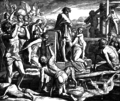
Back درگاه:شهرها Persian Wikipedia:Pooz/Städt KSH Portaal:Steden Dutch Cổng thông tin:Thành phố Vietnamese
The Cities Portal

A city is a human settlement of a notable size. The term "city" has different meanings around the world and in some places the settlement can be very small. Even where the term is limited to larger settlements, there is no universally agreed definition of the lower boundary for their size. In a more narrow sense, a city can be defined as a permanent and densely settled place with administratively defined boundaries whose members work primarily on non-agricultural tasks. Cities generally have extensive systems for housing, transportation, sanitation, utilities, land use, production of goods, and communication. Their density facilitates interaction between people, government organizations, and businesses, sometimes benefiting different parties in the process, such as improving the efficiency of goods and service distribution.
Historically, city dwellers have been a small proportion of humanity overall, but following two centuries of unprecedented and rapid urbanization, more than half of the world population now lives in cities, which has had profound consequences for global sustainability. Present-day cities usually form the core of larger metropolitan areas and urban areas—creating numerous commuters traveling toward city centres for employment, entertainment, and education. However, in a world of intensifying globalization, all cities are to varying degrees also connected globally beyond these regions. This increased influence means that cities also have significant influences on global issues, such as sustainable development, climate change, and global health. Because of these major influences on global issues, the international community has prioritized investment in sustainable cities through Sustainable Development Goal 11. Due to the efficiency of transportation and the smaller land consumption, dense cities hold the potential to have a smaller ecological footprint per inhabitant than more sparsely populated areas. Therefore, compact cities are often referred to as a crucial element in fighting climate change. However, this concentration can also have significant negative consequences, such as forming urban heat islands, concentrating pollution, and stressing water supplies and other resources. (Full article...)
Selected city -
Istanbul is the largest city in Turkey, straddling the Bosporus Strait, the boundary between Europe and Asia. It is considered the country's economic, cultural and historic capital. The city has a population of over 15 million residents, comprising 19% of the population of Turkey, and is the most populous city in Europe and the world's fifteenth-largest city.
The city was founded as Byzantium in the 7th century BCE by Greek settlers from Megara. In 330 CE, the Roman emperor Constantine the Great made it his imperial capital, renaming it first as New Rome (Ancient Greek: Νέα Ῥώμη Nea Rhomē; Latin: Nova Roma) and then finally as Constantinople (Constantinopolis) after himself. In 1930, the city's name was officially changed to Istanbul, the Turkish rendering of εἰς τὴν Πόλιν eis tḕn Pólin 'to the City', the appellation Greek speakers used since the 11th century to colloquially refer to the city. (Full article...)Did you know -
- ... that when the New York City Subway's 14th Street–Union Square station was built, the park above it was raised?
- ... that a former armory in New York City later housed ESPN offices?
- ... that George Balanchine choreographed his ballet Scherzo à la Russe for the New York City Ballet's Stravinsky Festival, a tribute to the composer after his death?
- ... that Midwest Scientific was the only maker of microcomputers in Kansas City in the late 1970s?
- ... that while 1271 Avenue of the Americas was being built at New York City's Rockefeller Center, Marilyn Monroe re-launched the Center's long-dormant "Sidewalk Superintendents' Club"?
- ... that a former radio host got a free apartment in New York City's King Manor and lived there for more than three decades?
Related portals
Related WikiProjects
Spokane (/spoʊˈkæn/ spoh-KAN) is the most populous city in and the county seat of Spokane County, Washington, United States. It is in eastern Washington, along the Spokane River, adjacent to the Selkirk Mountains, and west of the Rocky Mountain foothills, 92 miles (148 km) south of the Canadian border, 18 miles (30 km) west of the Washington–Idaho border, and 279 miles (449 km) east of Seattle, along Interstate 90.
Spokane is the economic and cultural center of the Spokane metropolitan area, the Spokane–Coeur d'Alene combined statistical area, and the Inland Northwest. It is known as the birthplace of Father's Day, and locally by the nickname of "Lilac City". Officially, Spokane goes by the nickname of Hooptown USA, due to Spokane annually hosting Spokane Hoopfest, the world's largest basketball tournament. The city and the wider Inland Northwest area are served by Spokane International Airport, 5 miles (8 km) west of Downtown Spokane, which is located near another airfield at Fairchild Air Force Base. According to the 2010 census, Spokane had a population of 208,916, making it the second-most populous city in Washington, and the 97th-largest city in the United States. At the 2020 census, Spokane's population was 228,989. A 2023 estimate sets the population of the metropolitan area at 600,292. (Full article...)Selected article -

The London Underground (also known simply as the Underground or by its nickname the Tube) is a rapid transit system serving Greater London and some parts of the adjacent home counties of Buckinghamshire, Essex and Hertfordshire in England.
The Underground has its origins in the Metropolitan Railway, opening on 10 January 1863 as the world's first underground passenger railway. It is now part of the Circle, District, Hammersmith & City and Metropolitan lines. The first line to operate underground electric traction trains, the City & South London Railway in 1890, is now part of the Northern line. (Full article...)General images -
Topics
List articles
Subcategories
Associated Wikimedia
The following Wikimedia Foundation sister projects provide more on this subject:
-
Commons
Free media repository -
Wikibooks
Free textbooks and manuals -
Wikidata
Free knowledge base -
Wikinews
Free-content news -
Wikiquote
Collection of quotations -
Wikisource
Free-content library -
Wikiversity
Free learning tools -
Wiktionary
Dictionary and thesaurus








































